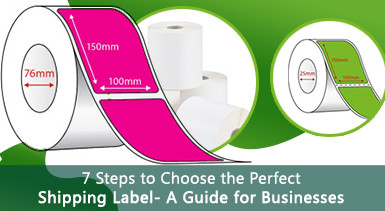Posted by Label Warehouse on 29th Sep 2023
7 Steps to Choose the Perfect Shipping Label: A Guide for Businesses
In the world of logistics and e-commerce, choosing the right shipping label is a critical decision that can greatly impact the efficiency of your operations and the satisfaction of your customers. Shipping labels serve as the face of your package, conveying essential information and ensuring a smooth delivery process.
In this blog, we will walk you through 7 key steps to help you decide on the right shipping label, with a particular focus on shipping label rolls and freight label size, as well as delve deeper into each step for a more comprehensive understanding.
Let’s start by discussing-
What are Shipping Labels?
Shipping labels are adhesive tags or stickers affixed to packages and parcels. They contain vital information required for the transportation and delivery of goods, including the sender's and recipient's addresses, barcodes, tracking numbers, and sometimes additional instructions. Shipping labels serve as a communication tool between businesses, carriers, and customers, ensuring that packages are accurately routed, delivered to the right destinations, and can be tracked throughout their journey. These labels come in various materials, sizes, and designs to cater to the specific needs of different businesses and shipping scenarios, making them an essential component of the modern logistics and e-commerce landscape.
Who Needs Shipping Labels?
Shipping labels are essential across a wide range of industries that rely on accurate, efficient, and traceable delivery systems. Whether you're sending a single parcel or managing high-volume logistics, the right shipping label can make all the difference. Below are key sectors that depend heavily on shipping labels in their daily operations:
eCcommerce Retailers
Online stores and marketplaces, from small businesses to large enterprises, depend on shipping labels to send products to customers worldwide.
Manufacturers
Manufacturers use shipping labels to identify and track products as they move through the supply chain, from production facilities to distribution centres and retailers.
Wholesalers and Distributors
Companies that distribute products to retailers or other businesses rely on shipping labels to ensure accurate and efficient deliveries.
Logistics and Freight Companies
Freight carriers, logistics providers, and shipping companies use shipping labels extensively to manage and track shipments.
Fulfilment Centres
eCommerce fulfilment centres and third-party logistics (3PL) companies require shipping labels to process orders and coordinate shipments on behalf of multiple businesses.
Food and Beverage Industry
Producers of perishable goods, such as food and beverages, use shipping labels for compliance with food safety regulations and to maintain product traceability.
Medical and Pharmaceutical Companies
Pharmaceuticals and medical equipment manufacturers use shipping labels to ensure secure and accurate delivery of critical healthcare supplies.
Automotive Industry
Manufacturers and suppliers in the automotive sector use shipping labels to identify and trace parts and components as they move through the production and distribution process.
Textile and Apparel Companies
Clothing manufacturers and textile businesses rely on shipping labels to manage their inventory and distribution networks.
Electronics and Technology Sector
Companies producing electronics and technology products use shipping labels for efficient shipping and to help consumers identify genuine products.
Print and Publishing Companies
Publishers and printing businesses utilise shipping labels to send books, magazines, and printed materials to distributors, retailers, or direct customers.
Art and Collectibles Dealers
Art galleries, auction houses, and collectors require shipping labels to send valuable and delicate items securely.
Pharmacy and Healthcare
Pharmacies and healthcare facilities use shipping labels to manage prescription deliveries and medical supplies.
Agriculture and Farming
Agricultural businesses may use shipping labels to mark and track shipments of produce, seeds, and livestock.
Construction and Building Materials
Companies in the construction industry use shipping labels for the efficient distribution of construction materials and equipment.
Chemical and Hazardous Materials
Chemical manufacturers and distributors rely on shipping labels to comply with safety regulations when transporting hazardous materials.
Furniture and Home Decor
Furniture manufacturers and retailers utilize shipping labels for the delivery of home furnishings and decor items.
The Significance of Shipping Labels in Business
Shipping labels do far more than just display addresses—they play a critical role in the overall logistics process. From enhancing operational efficiency to reinforcing brand identity, the right shipping label can impact multiple areas of your business. Let’s explore the key benefits in detail:
Efficiency and Accuracy
Shipping labels streamline the shipping process, reducing the likelihood of errors. They ensure that crucial information, such as recipient addresses, is accurately recorded, minimising the risk of misdelivery or lost packages. This efficiency is vital for maintaining customer trust and satisfaction.
Branding and Professionalism
Customised shipping labels with your company's logo and design elements serve as a powerful branding tool. They convey professionalism and create a cohesive brand experience for your customers. Consistent branding enhances brand recognition and customer loyalty.
Compliance with Regulations
In the complex world of shipping, different carriers and international regulations require specific labelling standards. Shipping labels ensure that your packages comply with these standards, preventing delays, fines, or rejected shipments.
Tracking and Traceability
Shipping labels often include barcodes and tracking numbers, enabling real-time package tracking. This feature is invaluable for both businesses and customers, as it provides transparency and peace of mind throughout the shipping journey.
Inventory Management
Businesses can use shipping labels to implement efficient inventory management systems. Labels can contain SKU numbers or other identifiers that help warehouse staff quickly locate and organise products, reducing handling time and errors.
Cost-Effective Solutions
Choosing the right label materials and sizes can lead to cost savings. For instance, thermal labels used with shipping label rolls can be more economical for high-volume shippers due to their efficient use of resources.
Sustainability and Environmental Impact
Many businesses today are conscious of their environmental footprint. Sustainable label materials and printing practices can help reduce waste and lower the overall environmental impact of shipping operations.
Customer Experience
Shipping labels play a crucial role in shaping the customer experience. Labels that are easy to read and aesthetically pleasing contribute to a positive perception of your brand. Moreover, clear and informative labels help customers understand delivery options and instructions, enhancing their overall experience.
Time Savings
Pre-printed shipping labels save time during the shipping process, especially when dealing with multiple orders. Employees can focus on other aspects of the logistics chain, leading to increased productivity.
Scalability
As your business grows, shipping labels can scale with you. Whether you're shipping a few packages or thousands each day, the right label solution can accommodate your needs.
7 Steps to Choose the Perfect Shipping Label
Selecting the right shipping label involves more than just picking a sticker—it’s about ensuring efficiency, compliance, and professionalism throughout your logistics process. The following seven steps will guide you in making the best choice based on your business needs and shipping environment:
Identify Your Needs
The first step in choosing the right shipping label is to identify your specific needs. This encompasses more than just the basics. Consider the type of products you are shipping. Are they fragile, perishable, or require special handling? The nature of your products will impact label material and design choices.Moreover, assess the volume and frequency of your shipments. If you are a high-volume shipper, you may benefit from label rolls to ensure a constant supply. On the other hand, if your shipping needs are sporadic, individual label sheets might be more suitable.
Choose the Right Label Material
Shipping labels come in various materials, each with its own advantages and drawbacks. You have the option of paper labels, thermal labels, or waterproof labels. Paper labels are cost-effective but may not withstand harsh environmental conditions. Thermal labels, which are commonly used with shipping label rolls, offer excellent print quality and durability. Synthetic labels are waterproof and resistant to extreme temperatures, making them ideal for challenging shipping environments.
Select the Appropriate Size
Freight label size is crucial for readability and compliance with carrier specifications. While 4" x 6" and 4" x 8" are common label sizes, remember that the size should align with your package dimensions. Oversized labels can look unprofessional, while undersized labels may not fit all the necessary information. Measure your packages accurately and choose label sizes that strike the right balance.
Consider Label Printing Technology
Decide on the label printing technology that suits your business best. As mentioned earlier, thermal printing is a popular choice for its cost-effectiveness and speed. Thermal printers are often used in conjunction with shipping label rolls, providing a convenient and continuous supply of labels for high-volume shipping operations. However, laser and inkjet printers are also options for smaller-scale operations.
Customise Your Labels
To reinforce your brand identity and improve package recognition, consider customising your shipping labels. In addition to the essential information like the recipient's address, return address, barcodes, and tracking numbers, you can incorporate your company logo and design elements. Customisation adds a professional and branded touch to your shipments, enhancing your company's image.
Ensure Compliance with Shipping Regulations
Different shipping carriers have specific requirements for labelling. To avoid delays, extra costs, or rejected shipments, ensure that your chosen labels comply with these regulations. Review carrier guidelines for font sizes, barcode specifications, and other labelling details. Staying compliant is not just a best practice but a necessity in the world of shipping.
Test and Evaluate
Before committing to a large order of shipping labels, it's a good practice to test a small batch. This allows you to verify that the labels work seamlessly with your printing equipment and meet your quality standards. Make any necessary adjustments based on your testing results, and seek feedback from your shipping team to ensure the labels meet their practical needs as well.
Conclusion: Choose the Right Shipping Label for Your Business
Choosing the right shipping label is a vital step in optimising your shipping and logistics processes. By following these 7 steps, you can ensure that your labels are not only efficient and compliant but also a reflection of your brand's professionalism. Remember to consider factors such as label material, size, and printing technology, and always stay up-to-date with shipping regulations to keep your operations running smoothly. Whether you opt for shipping label rolls or individual labels, making informed decisions will benefit your business and your customers in the long run. Properly chosen shipping labels contribute to a seamless and hassle-free shipping experience, enhancing customer satisfaction and loyalty.
If you are on the hunt for premium quality shipping labels at the best prices, Label Warehouse is your go-to choice. Browse through our expansive selection and shop for the right shipping label for your business today.

